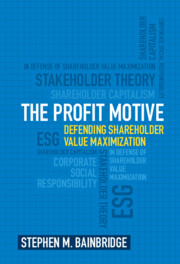Book contents
- The Profit Motive
- The Profit Motive
- Copyright page
- Dedication
- Contents
- Acknowledgments
- Editorial Note
- Introduction
- Part I The Law
- 1 The Battle of River Rouge
- 2 Fireplug Funding for Princeton
- 3 Why Didn’t the Cubs Have to Play Night Baseball?
- 4 Defending Dodge
- 5 To Make Stakeholder Capitalism the Rule, You Would Have to Change Most of Corporate Law
- 6 What about the Benefit Corporation?
- Part II The Merits
- Conclusion
- Notes
- Index
3 - Why Didn’t the Cubs Have to Play Night Baseball?
from Part I - The Law
Published online by Cambridge University Press: 02 February 2023
- The Profit Motive
- The Profit Motive
- Copyright page
- Dedication
- Contents
- Acknowledgments
- Editorial Note
- Introduction
- Part I The Law
- 1 The Battle of River Rouge
- 2 Fireplug Funding for Princeton
- 3 Why Didn’t the Cubs Have to Play Night Baseball?
- 4 Defending Dodge
- 5 To Make Stakeholder Capitalism the Rule, You Would Have to Change Most of Corporate Law
- 6 What about the Benefit Corporation?
- Part II The Merits
- Conclusion
- Notes
- Index
Summary
There are very few cases holding directors liable for failing to maximize shareholder value. The reason is the business judgment rule, a corporate law doctrine that precludes judges from reviewing the merits of director decisions absent some evidence of fraud, illegality, self-dealing, failure to make an informed decision, or waste of corporate assets. Shlensky v. Wrigley is the classic case of the business judgment rules application to cases in which the directors are alleged to have failed to maximize profit.
- Type
- Chapter
- Information
- The Profit MotiveDefending Shareholder Value Maximization, pp. 46 - 49Publisher: Cambridge University PressPrint publication year: 2023

